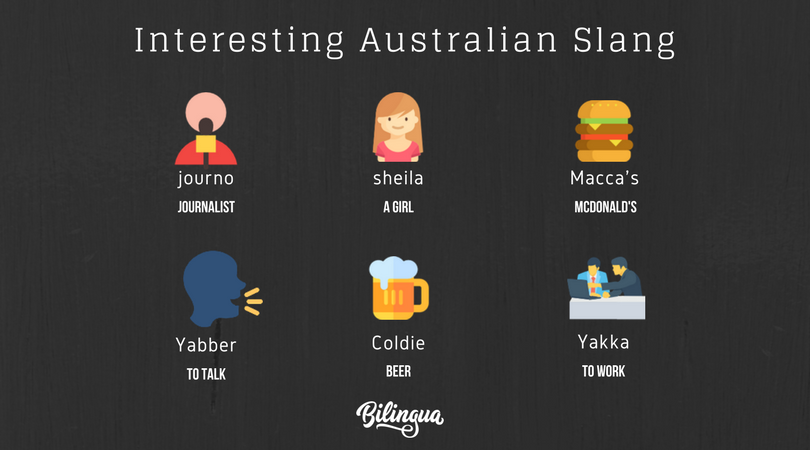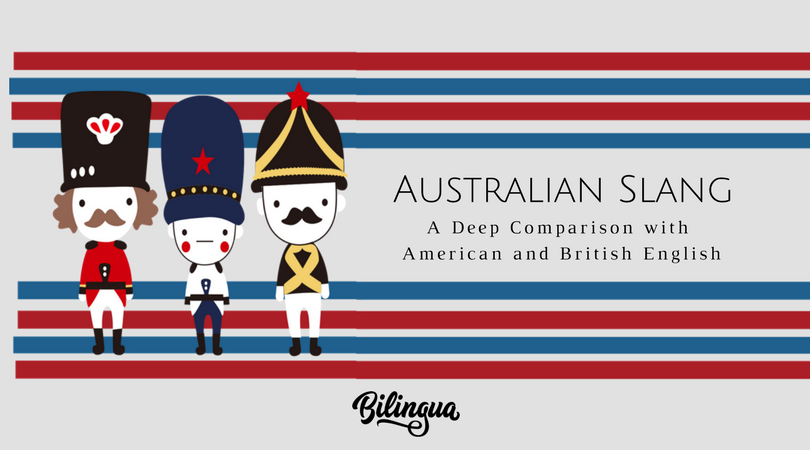Australian English is deeply fascinating. Have you ever played a rough game of “footie” or accidentally dropped your “togs” after completing a “ripper” set on your board? If this has happened to you, then you are not alone. In fact, many people on the earth’s smallest continent, Australia, deal with these similar struggles on a daily basis.
For the uninitiated, if you would have ever heard Aussies express these alien-sounding words, you might not decipher what exactly is happening. The reason for this confusion is that slang is often lost in translation, even among English speakers.
Language can be likened to the biological theory of evolution, in the sense that both language, and natural selection, are developed by their relative isolation. Language is shaped by, and moves forward with, history and contributing cultures; and, in turn, this constant and ever-changing morphology shapes words and the culture surrounding words.
Some Ways That The English Language Has Evolved
So why is Australian English so diverse and unique? How did it evolve so far away from its American and British brothers?
It is simple.
Looking at many examples, where common languages, whose seeds were spread through colonization, obtain certain traits of their own; some of these languages remain similar to their mother tongue, such as in the case of Continental Spanish and Latin American Spanish, with slight deviations in word usage, while maintaining the overall structure of the original tongue.
 However, some languages diverge completely until almost a whole new language is formed. For example, the seed of the Dutch language was planted during colonization in South Africa, however, isolation, other linguistic influences, and time resulted in an almost newly distinct language called Afrikaans.
However, some languages diverge completely until almost a whole new language is formed. For example, the seed of the Dutch language was planted during colonization in South Africa, however, isolation, other linguistic influences, and time resulted in an almost newly distinct language called Afrikaans.
There are many examples of this type of morphology taking place in modern history; this process often results either in a language remaining relatively the same, or, conversely, becoming almost unintelligible from the mother language.
Australian English – A Unique Case?
This is also true of Australian English. The country’s isolation over time has resulted in a divergence from its linguistic cousins, American English and British English; although Australian slang, intonation, and pronunciation is much more attuned to the latter. This divergent process is to be expected when a country’s language has the opportunity to evolve independently on its own for such a long period of time.
It is also easy to understand why Australian English, with its mother tongue coming directly from English’s source, shares similar slang with British English.
For example, in Australian English and British English, the slang word “mate” has the same friendship connotation in both dialects, conversely, the meaning greatly differs from the meaning in American English, where the word means a spouse or life partner. So, if you called a “girl pal” in America your “mate”, you should get ready for a bewildered look at best.
Furthermore, both British and Aussie English have a long history of putting diminutive suffixes on words for convenience purposes. For example, the word “footie” has a common sporting meaning in both British and Aussie English; in the former dialect it refers to football (soccer), and in the latter, it refers to Australian Rules Football.
However, in American English, the words meaning is completely different. In American English, “footie” refers to a one-piece outfit, that completely covers your body from foot to neck, which you wear while sleep.
Suffice to say, if an Aussie asked an American to play “footie”, they would be a bit confused. Conversely, if an American boyfriend asked his Aussie girlfriend to play “footsie”- an intimate touching of the feet in American English- misinterpretation might arise, and he might of asked more than he bargained for.
Here are a few more examples of these diminutive words in Aussie English; some of these words include a coldie (beer), cockie (farmer), and blokey (man). Worth noting, for calling someone “cockie” (cocky) in America, you might be considered a “knocker”, and could get a punch to mouth.
Why is Aussie Slang Important
Knowing a country’s respective slang is more important than just being useful for clearing up misunderstandings, and fights, it allows you to fully immerse yourself into daily conversation, that is, it is a last step in fluency, it goes beyond repetitious verb tense and phonics drills, and offers you a fun and more full perspective of Australian culture.
It also allows you to understand words that have seemingly no connection to either British English or American English. Words that came about organically from the uniqueness that is Australia. Words that come from a variety of sources. For example, many slang terms have diverse cultural and aboriginal origins, such as, yabber (to talk), billabong (oxbow lake), yakka (to work).

Many slang words have come about organically, and are words that have either been modified or possess no distinct origin. Here are some of these words, that have been uniquely modified from their mother tongue; some of these words include, but are not limited to, hoon (hooligan), journo (journalist) and no-hoper (someone who is not expected to do well).
Outside English speakers may be able to understand the derivation of the word, but these types of words possess entirely different meanings from those of their American and British counterparts, thus making the meaning to the uninitiated completely unintelligible.
Similarly alien to American and British ears, some words some words came about directly from Australian culture, not by being directly modified from their original forms, but rather they were created organically.
A few examples of these types of words include a piker (a misfit), a pom (an Englishman), hooroo (good-bye), Sheila (girl), and dag (a funny person). These words, in comparison with the previously mentioned modified words, don’t offer America or British ears any context as to their meaning, thus leaving the listener utterly at a loss.
Although, Aussie some slang is much more similar to British English slang, than American, these types of words would seem completely alien to British English ears, and much more so to Americans’. This is another reason Australian English slang is important to learn. Even the most astute outside English speaker would be lost when listening to a fast-paced Australian casual conversation.
Check out these articles on methods to learn a new language:
The Tricky Elements of English Pronunciation



